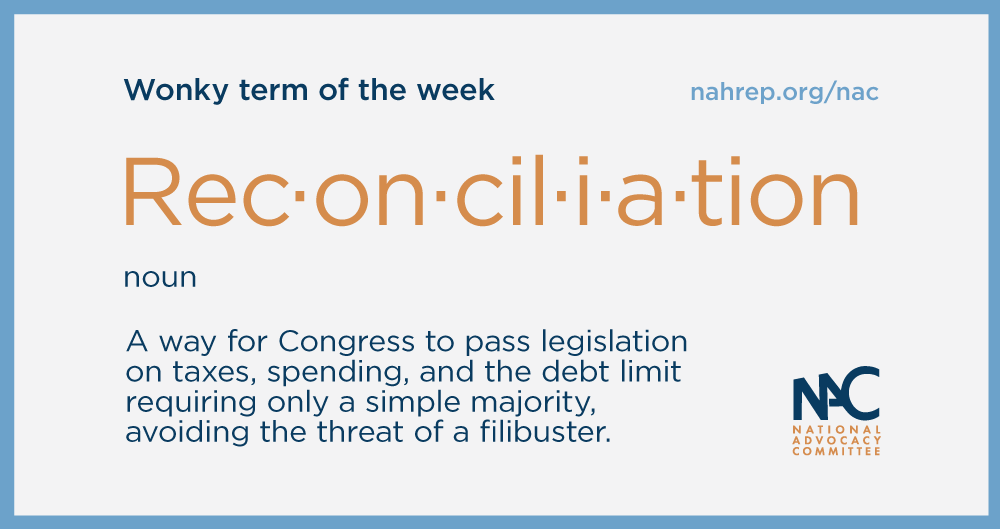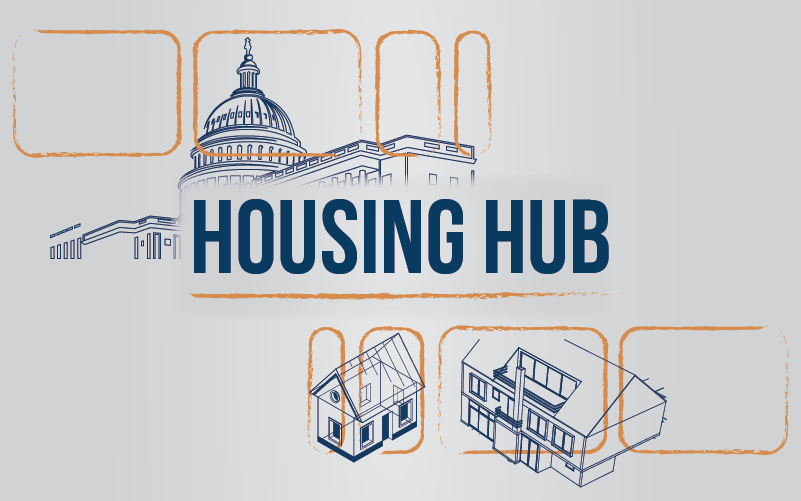NAC Blog: Reconciliation, no not forgiveness
Celebrating NAHREP familia, cultura, politics, and grassroots action
July 8, 2021
Qué onda mi gente?!
It’s time for another wonky policy term of the week explained. If any of you want to understand what in the world is happening right now in Congress with this infrastructure bill that seems to be moving at tortuga speed, let’s try to define another term the politico types throw around like pizza dough: reconciliation.
What the heck is reconciliation? No, it’s not what happens with your significant other after she/he/they pissed you off and then cooked you your favorite meal to lure you through your stomach. In this case, it’s a tool used in Congress to get tough things passed. The game of politics is more like sports than you think. In other words, reconciliation is a play.

What we might expect Congress to try to pass through reconciliation that apply to our policy priorities:
Housing Supply and Affordability Act (HSAA): This is probably the most consequential of the housing inventory bills we’re trying to pass through Congress. This bill would create a new Local Housing Policy Grant (LHPG) program administered by HUD. The proposed program would provide grants to states, localities, tribes, and regional municipal and county coalitions to support local efforts to expand housing supply. The HSAA complements legislation such as the bipartisan Yes in My Backyard (YIMBY) Act, which encourages local governments to eliminate exclusionary zoning and discriminatory land-use policies by providing the resources to make sure these plans are implemented.
Immigration: Some in Congress are angling to include immigration programs in a larger budget reconciliation package. Let’s face it, immigration has turned so divisive I don’t feel great about it passing through a regular 60 vote requirement. So, some believe that if drafted correctly, some elements of immigration could get passed through reconciliation. A recent budget reconciliation bill included $126 billion to put immigrants on a pathway to citizenship. Illinois Congressman Chuy Garcia even said that he won’t support a budget reconciliation package unless there is a pathway to citizenship to a broad spectrum of the country’s undocumented population.

The Supreme Court Ruling on FHFA
The Federal Finance Housing Agency (FHFA), the agency that oversees Fannie Mae and Freddie Mac, is the most influential agency to the mortgage lending industry by a longshot. Conventional loans, or loans purchased by Fannie and Freddie, account for half of the $11 trillion mortgage market. So, the person who leads the agency pretty much calls the shots around access to credit for the country.
A New Court Ruling: On Wednesday, June 23, the Supreme Court concluded that the FHFA was structured unconstitutionally because the President could not easily remove the agency’s director. The former Director Mark Calabria, appointed by President Trump, was determined to privatize Fannie and Freddie. On this quest, he made a lot of changes that led to a more restrictive credit environment for low- to moderate-income borrowers.
Immediately following the court decision, President Biden fired FHFA Director Mark Calabria and put in an interim director.
Why does this matter? This means that Fannie and Freddie Mac are not going to be privatized any time soon. And, President Biden has signaled that he wants a new director that focuses primarily on increasing minority homeownership. We’re going to keep a close eye on who the director might be and to ensure that conversations around bridging the racial homeownership gap include Latinos.
That’s it mi gente. I’m looking forward to seeing some of you in our upcoming regional events in Miami, FL and Newport Beach, CA. Don’t know what I’m talking about? Check here.

About Noerena Limón
Noerena Limón is NAHREP’s Executive Vice President of Public Policy and Industry Relations. Noerena heads the organization’s policy and advocacy efforts on issues ranging from homeownership, housing inventory, credit access and immigration.
Prior to joining NAHREP, Noerena spent six years at the Consumer Financial Protection Bureau (CFPB) and served as a political appointee under President Obama in the White House Office of Political Affairs.





